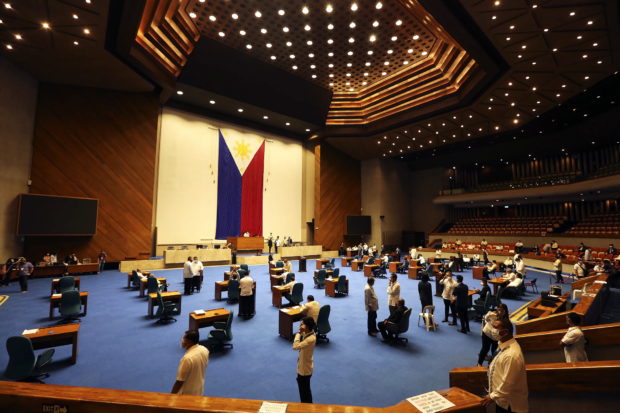
SOCIAL DISTANCING Members of the House of Representatives practice social distancing during the COVID-19 pandemic. Others join plenary sessions via Zoom. —FILE PHOTO
The Supreme Court has affirmed its decision upholding the constitutionality of the law that mandated the allocation of seats for party list groups in the House of Representatives.
Voting 7-6, with two justices both concurring and dissenting with the majority opinion, the high court threw out for “utter lack of merit” the appeal filed by Angkla, SBP and AKMA-PTM party lists, which sought to be declared winners in the 2019 midterms elections.
In a 17-page ruling, dated Dec. 7, 2021, but made public only on Thursday, the tribunal said the issues raised by the petitioners had already been discussed in its Sept. 15, 2020, decision and the petitioners did not raise any new arguments against the court’s ruling.
The court ruled that the Constitution did not explicitly state the number of seats to be given to winning party lists since that power was given to Congress through legislation.
It said Section 11(b) of Republic Act No. 7941, or the Party-List System Act, clearly stated that party lists needed to secure at least 2 percent of the votes cast for the party list system to get one House seat.
20% of House members
Thus, those that garnered more than 2 percent would get additional seats, the proportionality of which had already been spelled out in the high court’s 2009 ruling in Barangay Association for National Advancement and Transparency v the Commission on Elections, the court added.
The law also stipulates that 20 percent of the total House membership must be allotted to party list organizations representing the marginalized sectors of the society.
The court warned that granting the petition of Angkla et al., which claimed that the additional seats given to winning party lists resulted in “double counting” of votes, would be tantamount to “judicial legislation.”
‘Apply what is written’
“Clearly, [the] petitioners would have us plant words into [the law], which are not there … This would be nothing short of judicial legislation, if not usurpation of legislative powers, as it would allow us to substitute the wisdom of Congress with ours,” read the ruling penned by Associate Justice Amy Lazaro-Javier.
The tribunal, it said, had no authority to “‘correct’ laws by reading into them more than what they contain.”
“We merely apply what is written,” it stressed. “And what is currently written in [the law] does not need correction as it does not offend any constitutional guarantee.”
The justices said any change in the computation for the allocation of party list seats should be done by amending the law, “not to have the law ‘corrected’ through judicial fiat.”